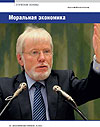Moral Economics
Today politicians, various experts and scholars from all the tribunes unanimously speak of the global systemic crisis that engulfed the entire civilized world and, of course, did not leave aside Russia, being an integral part of this world. More critical are becoming the search for an alternative to the existing world order, the shift of emphasis from satisfying the irrepressible appetites of global corporations to the individual’s interests with his quite understandable and sufficient needs. Here, the moral conduct of business or moral economy, ethical economy becomes a key global issue. The problems of economic ethics were raised and resolved throughout the whole history of the ethical teaching development . Aristotle, Thomas Aquinas, Immanuel Kant and other thinkers expressed many ideas about the goals and values of economic life, but the first attempt to address these problems systematically was undertaken by German thinker Max Weber. In Russia the term “moral economy” was first introduced by the Soviet economist Alexander Chayanov and his colleagues. In the 1920s, they proved that the family-labor economy, characteristic of Russia, was aimed not at making a profit, but at providing livelihood for its members. To what extent it is important to raise ethical issues in business, and how the ethical economy today can help the world in general, and Russia in particular to overcome the current situation – this is what we are talking about today with our guest, founder and head of the social network Globethics.net, professor of the Basel University Christoph Stuckelberger.



